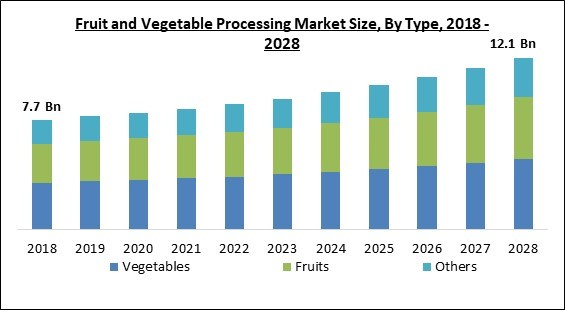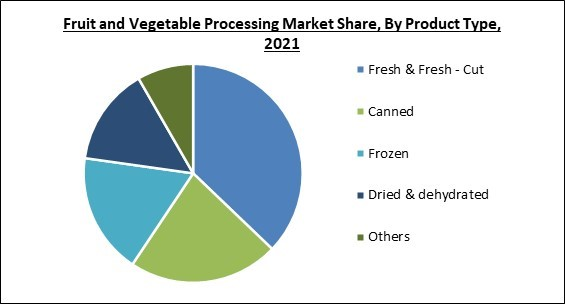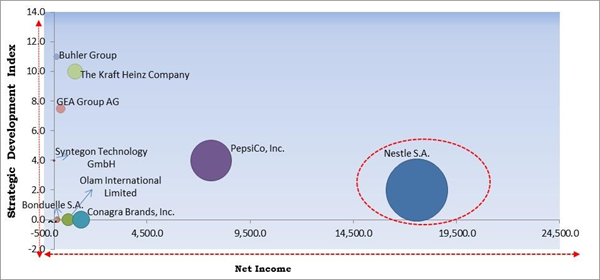Fruit and vegetable processing is a crucial procedure for producing ready-to-eat meals as well as meal ingredients. The major goals of processing fruits and vegetables are to maintain the flavor, color, texture, and nutrients of vulnerable fruits and vegetables while also extends their shelf life. Before direct intake of food, it is critical to process fruits and vegetables. The majority of these procedures depend on heat, and the quality criteria of fruits and vegetables are extremely sensitive to heat.
Globalization has resulted in an increase in commercialization all over the world in the modern era, along with intensive R&D endeavors by various food and beverage industries. Super-critical fluid technology, membrane technology, and molecular techniques such as Polymerase Chain Reaction (PCR) and High-Pressure Processing (HPP) technology are examples of advanced technologies for food processing.
Other non-thermal preservation techniques, such as ultrasound, pulsed electric fields, pulsed light, and obstacle systems, are used in modern processing technologies to keep food products" texture and freshness. Many market players in the fruit and vegetable processing sector are focusing on the development of new machinery as well as improving existing machinery. In addition, the market is expected to grow as more emphasis is placed on the marketing schemes, growth of facilities, and information sharing programmes to raise awareness and improve the applications of fruit and vegetable processing.
A major aspect driving the fruit-vegetable processing market is a growing awareness of the advantages of fruits and vegetables. Also, there is a surge in the demand for convenience meals Moreover, a growing foodservice sector and an increase in modern retail stores is expected to further facilitate the penetration of processing services across the food and beverages sector. Additionally, post-sale service contracts and government funding for SMEs is expected to provide numerous opportunity for the sector to expand.
COVID-19 Impact Analysis
During the Covid-19 pandemic, food safety, food security, and food conservation were all majorly affected. Consumer attitudes toward food consumption have completely shifted due to an increased emphasis on safety and quality. Manufacturers have been compelled to analyze the safety standards of their goods to maintain the value of their products in the market. A large portion of the world’s population has modified their food habits as a result of the Covid-19 pandemic. Many people are consuming less fresh fruits and vegetables as a result of limited access to traditional grocery items formats and outlets. More processed goods, such as convenience foods and processed foods, have emerged as a substitute of these products.Market Growth Factors:
Employment of energy-efficient food processing machinery
The key companies in the food industry are switching to energy-efficient and multi-functional food processing equipment, which might decrease operational costs and lead to long-term product development. For example, Tetra Pak has created modern equipment solutions that allow beverage manufacturers to carbonize at a low cost. Additionally food production accounts for a significant portion of the worldwide industrial energy usage. Some of the essential aspects for the development of the food processing equipment market include developing energy-efficient equipment, boosting equipment safety, and lowering maintenance costs. Versatility in aspects of sleek design and the ability to transfer between products with minimal downtime is becoming increasingly important in beverage processing.Protection and preservation through the Fruit and vegetable processor
Foods that have been processed are usually much easier to keep and preserve. As per the European Food Information Council, some food processing methods, such as freezing, and preserve nutritional content can also boost nutritious content. Furthermore, preserved goods last far longer than non-preserved items, making them easy to maintain and store without requiring more frequent purchases by the user. Another significant advantage of food processing is the ability of manufacturers to ensure food safety and eliminate or prevent harmful contaminants, such as pasteurization, kills toxic germs in raw milk, allowing it to be consumed by humans.Marketing Restraining Factor:
Disadvantages of the plastic processed food and vegetable cans
Processed Food storage containers made of plastic are lightweight, inexpensive and easy to find at most places. Despite their benefits in terms of storing supper leftovers and other food products, food containers can pose several risks. These hazards and risks range from health hazards to environmental damage for humans. Some plastic food containers were not designed to resist being cooked in a microwave oven. Moreover, such containers can melt or bend in the heat. Further, putting a non-microwave-safe plastic container in a microwave can cause dangerous chemicals to leach into food.Mode of Operation Outlook
Based on Mode of Operation, the market is segmented into Automatic and Semi-Automatic. The Semi-automatic segment recorded a significant growth in the fruit and vegetable Processing Market in 2021. Semi-automatic is a systematic procedure in which man and machine work together, with both human and artificial processes being controlled by a centralized computer controller. While leveraging these machines, workers hand pick the fresh vegetables and fruits and process them towards the machine for the further procedure. Semi-automatic fruits and vegetables processing machines consumes lesser operational costs.Product Type Outlook
Based on Product Type, the market is segmented into Fresh & Fresh - Cut, Canned, Frozen, Dried & dehydrated, and Others. The Fresh & Fresh - Cut segment garnered the largest revenue share in the Fruit and Vegetable Processing Market in 2021. The rising growth of this segment is due to the growing inclination of consumers toward healthy foods, such as organic and ready-to-eat fruits.. In addition, customers are preferring fruit items that are widely available and have good taste, such as fruit juices, as they are becoming more health-conscious.Type Outlook
Based on Type, the market is segmented into Vegetables, Fruits, and Others. The Vegetable segment acquired the largest revenue share in the Fruit and Vegetable Processing Market in 2021. Vegetables can be processed from fragile produce to stable foods with long shelf life, facilitating multilateral production and delivery of a wide range of vegetables. The purpose of processing vegetable is to protect the plant cells against microbial degradation and natural physiological deterioration. Blanching, freezing, canning, dehydrating, fermenting and pickling, and irradiating are some of the procedures used in the process.Equipment Type Outlook
Based on Equipment Type, the market is segmented into Fillers, Pre-processing, Peeling/Inspection/slicing, Packaging & handling, Washing & dewatering, Seasoning systems, and Others. The Pre-processing segment witnessed a substantial growth in the Fruit and Vegetable Processing Market in 2021. The rising growth of this segment is owing to the rapidly increasing technological advancements in this sector. The pre-cleaning, sorting, peeling, cutting, belching, and dewatering machines are examples of pre-processing machinery. Prior to in-depth processing, these are necessary therapeutic steps. Equipment for vegetables, fruits, seafood, medicine, and other items. These machines have a wide range of options for various items.Regional Outlook
Based on Regions, the market is segmented into North America, Europe, Asia Pacific, and Latin America, Middle East & Africa. The Asia Pacific region acquired the highest revenue share in the Fruits and vegetable processing market in 2021. The increasing growth of this segment is owing to the higher output along with lower cost of fruit and vegetable in this region. The increasing demand for nutritional food is having a big impact on the market for fruits and vegetables, and this is likely to offer more investment options in this region, which specializes in numerous agricultural products. Increasing spending potentials and increased affordability of freezer units, such as IQFs, are likely to support the constant expansion.Fruit and Vegetable Processing Market Competition Analysis
The major strategies followed by the market participants are Partnerships. Based on the Analysis presented in the Cardinal matrix; Nestle S.A. is the forerunners in the Fruit and Vegetable Processing Market. Companies such as Buhler Group and Syntegon Technology GmbH are some of the key innovators in the Market.
The market research report covers the analysis of key stake holders of the market. Key companies profiled in the report include PepsiCo, Inc., Conagra Brands, Inc., Nestle S.A., Syntegon Technology GmbH (Bosch Packaging Technology), Buhler Group, The Krones Group, Bonduelle S.A., GEA Group AG, Olam International Limited, and The Kraft Heinz Company.
Recent Strategies Deployed in Fruit and Vegetable Processing Market
Partnerships, Collaborations and Agreements:
- Feb-2022: Kraft Heinz formed a joint venture with TheNotCompany, the unicorn Chilean food-tech company. Under this joint venture, the companies focused on designing to readdress global food manufacturing and enhance the food sector towards a most defendable future. Additionally, with NotCo, Kraft Heinz intends to use its products and commercial abilities, with the scale of its overall food brands, to adjust the food landscape and fixed a new for plant-based innovation.
- Jun-2021: Swiss Bühler Group came into a partnership with Hosokawa Alpine Group, a provider of manufacturing machines, and systems for processing and handling of powders. Through this partnership, the companies aimed to boost the manufacturing of continuous plant protein solutions based on pulses. Additionally, the enterprise is expected to provide consumers procedure expertise and technology within the entire field-to-fork pulses protein chain.
- Feb-2021: Syntegon Technology came into a partnership with Sappi, South African Pulp, and Paper Industries. Under this partnership, the companies aimed to answer customer and parliamentary requirements for reuseable packaging by providing dependable and renewable paper-based packing solutions to the common large and medium-sized consumers in the confectionery stores.
- Jan-2021: Bühler and DIL Deutsches Institut für Lebensmitteltechnik e. V.research institute (Germany) teamed up to develop new production technologies for healthy and sustainable food products.
- Apr-2020: Syntegon Technology joined hands with BillerudKorsnäs 3D, a leading provider of packaging materials and solutions. This collaboration aimed to introduce TPU paper form, fill and seal machine forms ecological friendly formed paper pods with a stuffing volume of just a few and up to 100 milliliters. Additionally, The FibreForm paper is formed by air pressure and press force.
Acquisitions and Mergers:
- Sep-2021: The Kraft Heinz Company entered into an agreement to acquire & ldquo;Hemmer,” a Brazilian company focused on condiments and sauces. The acquisition is designed to expand consumers’ taste options in Brazil, while supporting Kraft Heinz's strategy of growing its International Taste Elevation product platform and its presence in emerging markets
- Jun-2021: The Kraft Heinz Company announced today that it has reached an agreement to purchase Assan Foods. Assan Foods manufactures and sells a wide range of products, including those that appeal to a variety of international cuisines and are sold under brands including Colorado.
- Jan-2021: Bühler took over Design Corrugating, a roller mill and other equipment service company based in Taylorville, Illinois. Through this acquisition, the company aimed to administer seven service centers in the US, pet food, oilseed, feed, serving grain, and chocolate processors, along with distillers and brewers, coatings and inks, and many other consumers using roller mills.
Product Launches and Product Expansions:
- Mar-2021: Bühler announced the digitalization of the connected rice mill of the future. Through this expansion, Bühler's original setup connecting whitener, sensors, and sorter is set to advance rice milling practices. Additionally, Machine learning and Artificial intelligence technology upgrade detached technologies into one smart combined system, saving energy, minimizing waste, and constantly delivering the best product quality.
Geographical Expansions:
- May-2021: GEA expanded its geographical footprint by establishing soya, oats, and rice plants in France. This expansion aimed to construct Laiterie de Saint-Denis-de-l’Hôtel, one of France's dominating producers of liquid food and vegetable items.
Scope of the Study
Market Segments Covered in the Report:
By Mode of Operation
- Automatic
- Semi-Automatic
- Fresh & amp; Fresh-Cut
- Canned
- Frozen
- Dried & amp; dehydrated
- Others
- Vegetables
- Fruits
- Others
- Fillers
- Pre-processing
- Peeling/Inspection/slicing
- Packaging & amp; handling
- Washing & amp; dewatering
- Seasoning systems
- Others
By Geography
- North America
- US
- Canada
- Mexico
- Rest of North America
- Europe
- Germany
- UK
- France
- Russia
- Spain
- Italy
- Rest of Europe
- Asia Pacific
- China
- Japan
- India
- South Korea
- Singapore
- Malaysia
- Rest of Asia Pacific
- LAMEA
- Brazil
- Argentina
- UAE
- Saudi Arabia
- South Africa
- Nigeria
- Rest of LAMEA
Key Market Players
List of Companies Profiled in the Report:
- PepsiCo, Inc.
- Conagra Brands, Inc.
- Nestle S.A.
- Syntegon Technology GmbH (Bosch Packaging Technology)
- Buhler Group
- The Krones Group
- Bonduelle S.A.
- GEA Group AG
- Olam International Limited
- The Kraft Heinz Company
Unique Offerings from the Publisher
- Exhaustive coverage
- The highest number of market tables and figures
- Subscription-based model available
- Guaranteed best price
- Assured post sales research support with 10% customization free
Table of Contents
Companies Mentioned
- PepsiCo, Inc.
- Conagra Brands, Inc.
- Nestle S.A.
- Syntegon Technology GmbH (Bosch Packaging Technology)
- Buhler Group
- The Krones Group
- Bonduelle S.A.
- GEA Group AG
- Olam International Limited
- The Kraft Heinz Company











